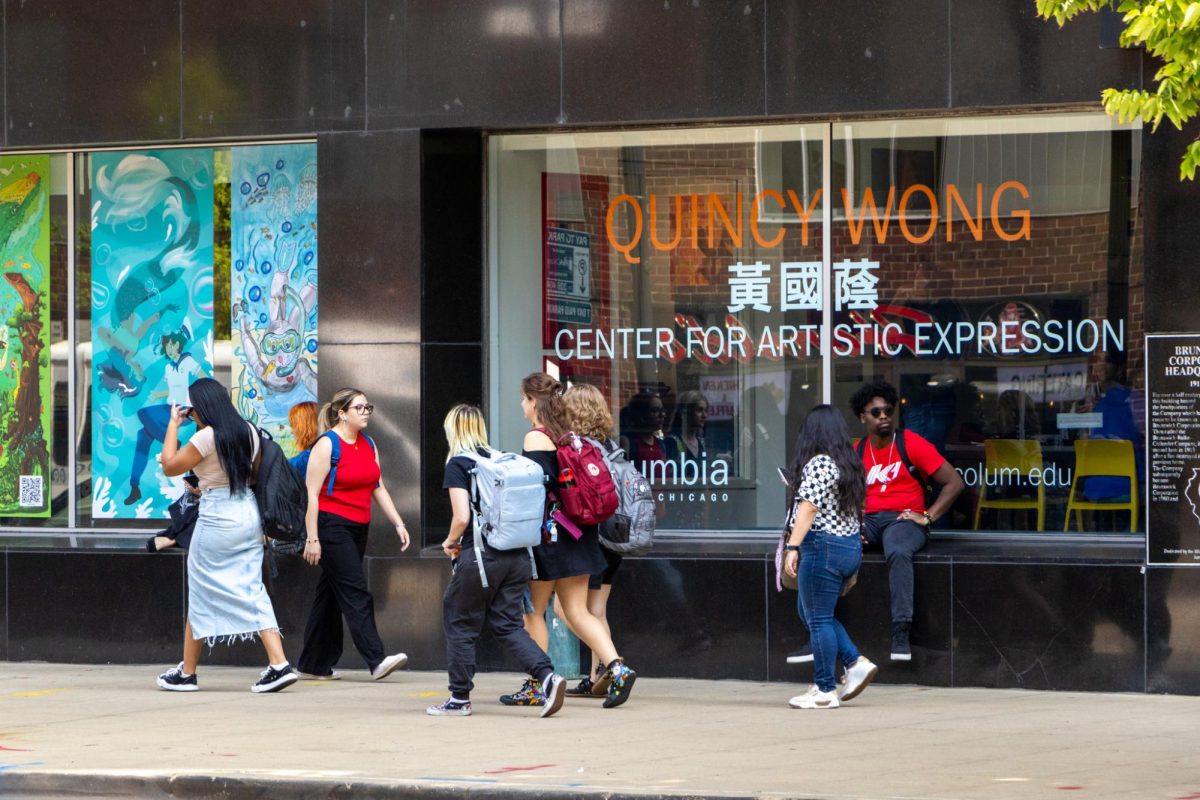
Dustin Janicki
Students walk and sit outside the 623 S. Wabash building on Wednesday, Sept. 11, 2024.
The day after Vice President Kamala Harris and former President Donald Trump faced off in their first televised debate, Columbia students weighed in on a presidential election that, for some, will be their first chance to vote.
First year transfer student and radio major Michael Romero went into the debate hoping it would be better than the previous one between Trump and President Joe Biden in June but still had low expectations.
“The candidates were a lot more engaging with each other, you could say they weren’t just bickering about each other’s golf skills for 20 minutes. They were actually, well one was debating on topics, the other was trying to talk over while the debate was happening,” Romer said.
Biden dropped out of the race this summer, and in August, Harris accepted the nomination to lead the Democratic Party ticket.
Biden had not polled well among Generation Z and millennial voters.
Senior music business major Jackie Krieger did not expect much out of the candidates, even with Harris now in the race.
“I genuinely expected a comedy act. I wasn’t sure whether they would actually speak on anything valid or if it would just be targeting each other.”
Romero was also surprised and disappointed by how much fact-checking had to be done by the moderators David Muir and Linsey Davis of ABC News.
“Probably the thing that surprised me most was the fact check that had to happen. I wasn’t expecting professionalism, but I don’t think anybody was expecting that,” said Romero. “The fact that they had to get the moderators to literally get involved during that and they fact-checked, is more than enough to say, in short, it’s childish.”
Krieger, on the other hand, was pleasantly surprised at how the candidates sometimes handled themselves.
“I think that in some ways, Trump was kind of the same in just, you know, getting stuck on himself. But there were some things that I think he did call Kamala out on that were valid. I think that her answers were very much politician answers, kind of avoiding actual answers,” said Krieger. “I think that she did a good job of picking out his weaknesses in some ways and hitting both ends of the spectrum, like the Israel issue, I feel like she stays very middle ground.”
First year traditional animation major Jonathan Taber agreed that the debate went better than the previous one; however, he felt there was still a great lack of maturity between both candidates.
“I think it was definitely better than the last one, definitely a lot better in terms of addressing points, but I just really wish it was just more mature from both parties kind of going at each other,” said Taber. “The whole point of that is to address issues with our country and not on a personal vendetta.”
Taber said he wished both parties had better execution of displaying their intentions as candidates.
“I think both parties know what they want, but they’re just executing it wrongly, and that’s what’s causing backlash and all of that,” Taber said.
According to a survey from the National Society of High School Scholars, nearly 70% of Gen Z had already made up their mind prior to the debate on who they are voting for.
But another Gallup poll also reported that half of Gen Z had “very little” trust in the presidency with two-thirds of them saying they are still “very likely” or “certain” to vote in the election.
First year traditional animation major Rubi Flores already disliked politics and she felt the debate reminded her why.
“Personally, I don’t really do politics, but since I was watching it, I kind of viewed it as another reason why I don’t like politics, because I really viewed it as an immature attack against each other,” Flores said.
Copy edited by Trinity Balboa
Resumen en Español:
El día después de que la vicepresidenta Kamala Harris y el expresidente Donald Trump se enfrentaron en su primer debate televisado, estudiantes de Columbia dijeron cómo se sentían sobre el debate. Para algunos estudiantes, esta será la primera vez que votan.
Los estudiantes sintieron muchas emociones, algunos estudiantes se sintieron decepcionados, pero también sorprendidos por lo que dijeron Harris y Trump.
Una encuesta de National Society of High School Scholars dijo que casi el 70% de la Generación Z ya había tomado una decisión antes del debate sobre por quién votarían.
Pero otra encuesta de Gallup dijo que la mitad de la Generación Z tenía “muy poca” confianza en la presidencia, y dos tercios de ellos dijeron que todavía es “muy probable” o “seguro” que votarán en las elecciones.
Resumen en Español por Araceli Ramirez
Resumen en Español copia editada por Doreen Abril Albuerne-Rodriguez
